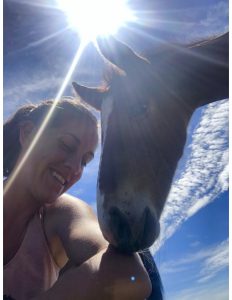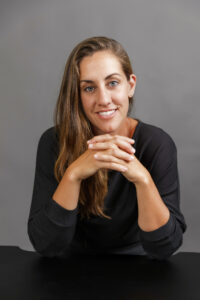Discover Your Voice With Our Creative Writing Short Courses Online
“To be a whole writer, a truly creative writer, we access the life we understand through lived experience and use it to feed what we write, from fiction to memoir to lyric to poetry to screenplays. If you understand your own life, you can better understand the lives of the characters you hope to write about.” – Jennifer Lauck
I’ll Never Write About My Life
And why I’m writing now what I swore I never would
By Carolyn Biemer – Former Student, Summer Studio Leader & Studio Mentor
When I began to study creative writing at The Blackbird Studio for Writers, I felt restless in my creative process. I loved my work, and it was going well, but something slowed me down. I was hitting a creative barrier and hoped studying in a literary program might help.
I introduced myself to my teacher and fellow students as a “fiction writer shooting for a novel.” When pressed for detail, I talked about my love of nature writing and my fascination with magical realism. I might have admitted some interest in a short story.
Memoir? Creative non-fiction? No thanks.
Yep, I get it. There I was at The Blackbird Studio, run by Jennifer Lauck, who wrote the New York Times Bestselling memoir Blackbird: A Childhood Lost and Found and several other memoirs and essays, but I remained positive that the form was not for me. My life was boring, my stories mundane—nothing anyone would want to read. Ergo, I wrote many things, but I never wrote me.
In the Fall of 2021, I joined a pilot program at Blackbird called The Whole Writer, inspired by George Saunders at Syracuse University. Our goal was to search for, find, and stabilize the unique and authentic voice within each of us. Saunders called this voice the “iconic space.” Through meditation, the study of Enneagram charts, the exploration of cultural influences that impacted us throughout our lives, and writing prompts, Jennifer guided a small collective of writers to lower barriers in the way we thought about our creative lives.
My first assignment for the program was to write about a difficult horse I had trained at some point.
Wait.
Stop.
No.
I am a fiction writer.
Jennifer suggested I “try.”
I accepted the assignment grudgingly. I may have snuck in an eye roll before I finally gave in and started.
 Sitting in front of my laptop, I remembered Betty, a hellion of a rescue filly I’d brought home years before. For the first few paragraphs, a message flashed through my head like a neon sign: Who cares? Who cares? Who cares? But I pushed myself to keep going until, a few paragraphs later, a strange thing happened; I slipped into the past to see the terrified whites of Betty’s wild eyes and felt the way her shoulder twitched when I brushed my fingers against her golden coat. I remembered the searing pain when her hoof slammed into my thigh and then the purples and blues and blacks of the bruise that swam up from beneath my skin, the smell of her sweat, the grit of the dust between my palms and the rope I used to bring her around, and the soft liquid brown of Betty’s eyes when the wild slipped away and she finally softened toward me. The “Who cares?” message stopped flashing, and my life spilled onto the blank pages.
Sitting in front of my laptop, I remembered Betty, a hellion of a rescue filly I’d brought home years before. For the first few paragraphs, a message flashed through my head like a neon sign: Who cares? Who cares? Who cares? But I pushed myself to keep going until, a few paragraphs later, a strange thing happened; I slipped into the past to see the terrified whites of Betty’s wild eyes and felt the way her shoulder twitched when I brushed my fingers against her golden coat. I remembered the searing pain when her hoof slammed into my thigh and then the purples and blues and blacks of the bruise that swam up from beneath my skin, the smell of her sweat, the grit of the dust between my palms and the rope I used to bring her around, and the soft liquid brown of Betty’s eyes when the wild slipped away and she finally softened toward me. The “Who cares?” message stopped flashing, and my life spilled onto the blank pages.
A few hours and a couple of thousand words later, I finished what would be the first draft.
I wish I could say I loved the piece, but I wasn’t there yet. Faced with revision, the neon sign was back with a new message: This is garbage. This is garbage. This is garbage. I felt embarrassed and self-indulgent. I cringed through my rewrite. When I finally shot it out to Jennifer, I included an apologetic email:
“Well, I tried,” I wrote, “… so here ya go.”
The message that came back from her read: “This is it.”
She meant that I had stumbled into the world of my whole writer self. When we met and talked through the story, she showed me the lines I wrote that no one else could write. We laughed and cried and laughed a little more, and I started to understand. I knew those parts of the story so well that I could live inside them, the ones that felt so close they wrote themselves and brought out something more authentically me in my writing than I knew I was capable of. I didn’t have to love the process, but I could see how it could help me grow.
With this new understanding, the floodgates opened. Memories lined up. Instead of Who Cares? or This is garbage, the new message was: Pick me! Pick me! Pick me!
I wrote about a stormy walk through downtown Manhattan with my grandmother when I was six years old. Then came the story of an unbearably awkward photo taken in first grade. Next was a story about a set of seedlings I planted in my early twenties that were smashed by a hailstorm. My stories were simple things, moments that had always shimmered in my memory as attractive, amorphous blobs. I started to enjoy the process of recording them, organizing them, and trying to understand what made them shine.
One thing Jennifer regularly reminds us of at Blackbird is that readers respond to authenticity. I confirmed this for myself as I explored material from my own life. When I read the stories in class, my generous studio mates were as enthusiastic and engaged as Jennifer. They asked interesting questions. “Boring” life and all, they wanted more. It was here that I finally surrendered to the experience.
I am happier and more satisfied with my writing than I have been in a long time. The stories from my life help me crank out words, bring me closer to my characters, and remind me always to stay present in my scenes. My voice feels true to me, my work resonates with readers, and while it isn’t fiction yet, I understand how I can use this material to feed my future career in any genre. I have discovered that I am off the hook for creating “something new” based only on my imagination and instead find a deep richness by leaning into my past.
Is this a sales pitch for creative non-fiction? For memoir? Maybe, or maybe not. For me, dropping the barriers to my thinking and “writing myself” cracked open my writing life. For you, it could be something different. The lesson I’ve learned here at Blackbird is that creative writing can and should take you places you never expected. And that what you fight most could be where you most need to go. You can deny it. You can kick and scream. You can try to package your work into the neat little box of things you’re comfortable with. Or you can let it flow and be amazed.
Is there some form or topic you resist?
Start with asking yourself why.
Or better yet, can you visit that place and watch the messages that flash through your head and see them change as you forge into the unknown…despite resistance?
Let me know, and good luck!
Carolyn Biemer is available to mentor fellow Studio writers and is working on several projects, including a novel and a slew of short stories. Contact Jennifer for details.



This piece is enthralling, Caroline. It speaks to anyone who has ever wanted to express themselves on the page with grace and ease and truth. Thank you for sharing.
I loved this piece– thank you for writing it.